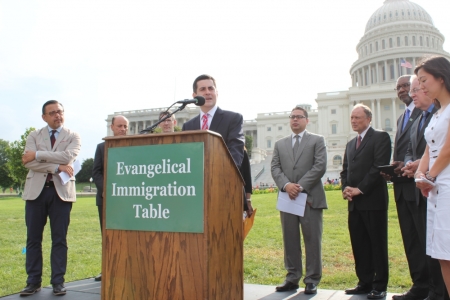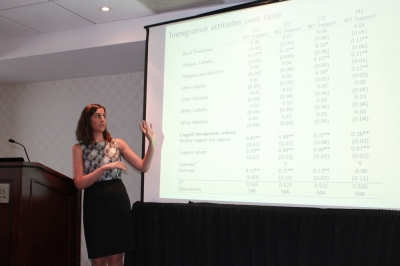Evangelical Ads Changed Attitudes on Immigration, Study Finds

The Evangelical Immigration Table's efforts to build support for immigration reform have achieved modest success, according to new research.
White Evangelical Republicans have moved more in the direction of supporting immigration reform, especially in the states where EIT bought radio ads, Michele Margolis, assistant professor of political science at the University of Pennsylvania, reported. Her paper, "What are the reaches and limits of religious influence? Religious messages and immigration attitudes," was presented Saturday at the American Political Science Association Annual Meeting.
Between February 2013 and February 2014, Evangelical Republicans became slightly more supportive of immigration reform while non-Evangelical Republicans became more opposed to immigration reform. The differences among white Evangelicals were even more pronounced in the states that had EIT radio ads, despite the fact that white Evangelicals in those states started out more opposed to immigration reform than white Evangelicals in the states that did not have EIT radio ads, Margolis found.
The EIT is a coalition of Evangelical groups and leaders from across the political spectrum formed in 2012 to call for reform of the U.S. immigration system based upon a set of six principles. The coalition includes Bread for the World, National Association of Evangelicals, National Hispanic Christian Leadership Conference, Sojourners, the Southern Baptist Convention's Ethics & Religious Liberty Commission, World Relief and World Vision.
As part of the EIT's mobilization efforts in 2013, radio ads featuring Evangelical pastors were bought in 16 states. Some congregations also participated in EIT's "40 Day Prayer Challenge," by spending 40 days reading and praying about 40 Bible verses related to immigration.
Immigration reform appeared to have some momentum in the summer of 2013 after the U.S. Senate passed immigration reform legislation. In the U.S. House, however, supporters of reform have produced some legislation in committees but have so far been unable to bring any of those bills to the floor for a vote, despite the fact that Speaker of the House John Boehner supports reform.
Margolis used The American Panel Study, a nationally representative sample of 2,000 adults who were first interviewed in February 2013, while the EIT was still young; again in September 2013 after the radio ads and "prayer challenge" began; and again in February 2014.
Among white Evangelical Republicans, she found, opposition to immigration reform that includes a path to legal status for unauthorized immigrants dropped 12 percentage points, from 62 percent in February 2013, to 55 percent in September 2013, to 50 percent in February 2014. During the same period, non-Evangelical Republicans moved in the opposite direction, becoming more opposed to immigration reform.
Margolis found further evidence that this divergence between non-Evangelical and Evangelical Republicans was due to the EIT by comparing white Evangelicals in the states that had EIT radio ads to those in the states that did not have the ads.

Opposition to immigration reform among white Evangelicals decreased 15 percentage points, 62 to 47 percent, in the states that had the EIT radio ads — Arizona, California, Colorado, Florida, Georgia, Idaho, Illinois, Kentucky, Montana, North Carolina, Ohio, Oklahoma, South Carolina, Tennessee, Texas and Wisconsin. In states without the ads, however, white Evangelical opposition to immigration reform remained the same at 50 percent.
In addition to the panel data, Margolis conducted a 1,000 person experiment using one of the EIT's radio ads. Respondents were divided into three groups — those who listened to the original ad, those who listened to the ad with religious language removed, and a control group that did not listen to an ad. They then answered three questions about immigration.
Support for immigration reform and a path to citizenship for unauthorized immigrants, and opposition to deportation for unauthorized immigrants were higher among born-again Christians and biblical literalists who heard the EIT ad compared to born-again Christians and biblical literalists who heard the ad without religious language or did not hear an ad.
Margolis concluded that the combined pieces of evidence points to the EIT having some modest success in influencing Evangelical attitudes on immigration.





















